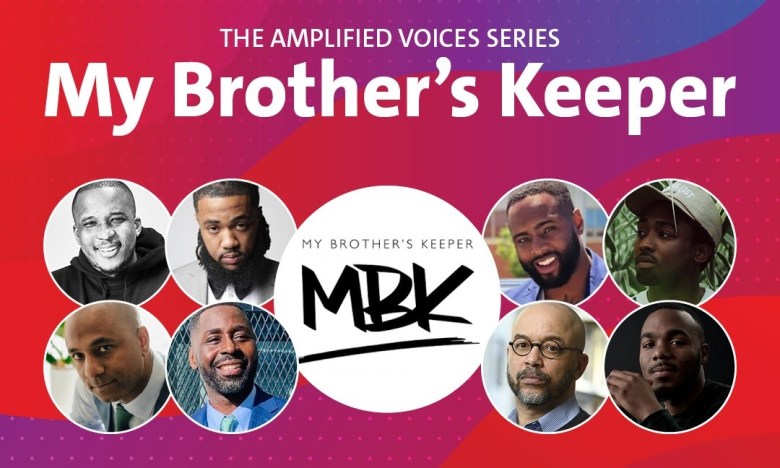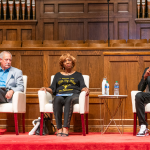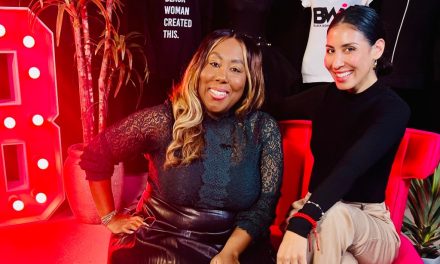By Khira Moore,
AFRO Intern,
Special to the AFRO
On July 26 the Enoch Pratt Free Library’s Central Branch held the second offering of a much-needed initiative, the Amplified Voices Series, My Brothers Keeper. The conversation was aimed at combating the barriers that impact Black male youth in Baltimore City.
The event included a meet and greet, held in the Edgar Allan Poe Room, and a variety of food options from Addison Kitchen, a local plant based eatery.
Director of Equity and Fair Practices M’Balu “Lu” Bangura hosted the event and D. Watkins, best-selling author and award winning professor at University of Baltimore, moderated the panel.
Watkins was joined by seven community change makers, teachers and activists in the Baltimore community.
Panelist Wallace “Wallo267” Peeples is a Philadelphia native who, after being sentenced 20 years in the Pennsylvania Department of Corrections for armed robbery, became an activist. He is now a cultural advisor for Youtube, Peeples spoke to the crowd about the foundations that he lives by:“ giving information, giving our time and giving back,” along with the value of “consistency and discipline.”
Aaron Maybin, the former NFL star turned artist and activist, also participated in the conversation. While speaking in front of the audience, Maybin highlighted the importance of Black men and boys having a supportive “village” to lean on.
“We have a bunch of hoods, but we don’t have a village,” said Maybin. “I hear way too many people judging, but not enough people [asking] “how can we stand with you?”
CarlMichael “Stokey” Cannady, founder of the Stokey Project, and Wesley Hawkins, an author and founder of the nonprofit, The Nolita Project, also lent their voice and years of experience to the panel.
Dr. Lawrence Jackson, author, professor and director of the Billie Holiday Center for the Liberation Arts, pointed out the tie between decay in the city and the historical implications that cannot be ignored. Jackson spoke on how major global conflicts, like the Vietnam War, significantly increased drug abuse in Baltimore City.
“Of the eight million service men that went to Vietnam, about two million returned with some form of addiction to either drugs or heroin,” said Jackson. “Here in Baltimore that was absolutely devastating, maybe even more devastating here than any place else in North America.”
Other Black men to round out the panel included Kondwani Fidel, a poet and Virginia State University grad that returned to the city to pursue his love of literature, and Elijah Miles, youngest member on the panel and CEO of the Tendea Family.
The streets are calling
Attendees heard the men discuss the hardships that come with growing up in impoverished and crime ridden neighborhoods. The audience also heard the men talk about dealing with the pressures of “hood culture.”
“I grew up on a block in East Baltimore where all the men hustled and a lot of the women struggled. And a lot of families were below the poverty level,” said Hawkins. “I didn’t realize that [it] wasn’t okay. I didn’t realize the life that I was living was wrong because from birth all the way up until I was 24, I normalized it. I was living that lifestyle.”
In a city with over 1,000 overdoses on an annual basis, thousands of children are living in houses with addicts— or trying to survive in their absence. The men talked about the effects of addiction on the children of parents with substance abuse issues and other setbacks they wished they could change for the youth today.
“How dare I serve or do anything else negative in my community when I’ve been watching my mother…struggling and dying?” said Hawkins. As a result of his mother’s addiction, his siblings ended up in foster care. Even with personal pain attached to the drugs he sold, Hawkins ended up peddling the poisons to his community.
“In my hood you can be six, seven, eight months pregnant and the dude will still serve you. I said that I’ll never be that again.”
Though growing up in a high-crime, impoverished neighborhood can result in trauma, one panelist said he believes residents should invest where they live- not run from it.
“Too many of us are baptized in the ‘leave the hood’ gospel. Not too many of us are focused on the ‘changing the hood’ gospel [that is] focused on serving the hood—saving the hood,” said Miles. “Everybody can’t leave the hood—and if everybody did leave the hood, wherever they went they would create the hood where they go because the hood is not a place—it’s a mindset. It’s a culture, it’s a value set.”
Men like Peeples became the change they wished to see. By letting go of the “hood culture” that the Black community holds so dearly, he realized his full potential.
“I wasn’t built to be a criminal because my heart was set up in a different way. I realized I ended up in prison for chasing an idea of who the people said I had to be in order to be accepted in the Black community,” said Peeples, discussing his mindset at the time. “In the black community, nobody is as successful as the successful criminal.”
And the cost is expensive. According to the FBI’s Uniform Crime Report, in 2019, 26.1 percent of people incarcerated for drug abuse violations were Black.
Peeples now helps underprivileged children and struggling cities understand the importance of personal brand building through inspirational speeches and a rising social media presence.
CarlMichael “Stokey” Cannady has a similar mission through his organization, The Stokey Project. He represents artists (film, music, entertainment industries) in Baltimore and helps them build a platform and promote themselves. Cannady even served as an inspiration to Dr. Jackson, who saw him speaking to a crowd one day at the intersection of Pennsylvania and North Avenues. Cannady was talking about issues plaguing the city and his speech inspired Dr. Jackson to create a liberation program at John Hopkins University.
Though Jackson is a professor at one of the top universities in the world, he knew from an early age that it was easy to get sucked into the culture. He, unlike many that he knew, had a chance to “make it out.” He got a scholarship and attended Loyola-Blakefield High School and still ended up on a corner with his old friends who’d already adopted the street lifestyle—trying to be somebody he wasn’t.
In an attempt to look cool, Jackson expressed interest in taking part in illegal activities, something that could ruin his future. His friends, who’d witnessed his rise from being a top student at Mount Royal Elementary/Middle school to private school, were disappointed.
“It took a little while for it to sink in— that I, who had so many gifts and so many opportunities, was in the process of squandering them,” said Jackson. “I understood that time is short, future is never promised, you have to take advantage of the opportunities that you have immediately.”
Then there were men like Aaron Maybin who began his path after being declared partially illiterate in the Baltimore City Public School System. Once he reached high school, Maybin was educated in Howard County, where he says he began excelling as a result of having more resources aimed to better his education. Today, Maybin seeks to improve inner city schools and help students.
According to his personal website, he developed Project Mayhem to “provide aid, both personal and economic, to help underprivileged and at-risk youth excel beyond their current conditions.”
Each panelist agreed that in order to save the communities in Baltimore City, they have to start with inner-city youth.
A people with a purpose
In 2013, Elijah Miles was a summer intern at Teach for America and at 18, he went viral for a speech he gave to a group of new teachers. At the time, Miles spoke on the importance of educating youth and making a commitment to change the hoods instead of deserting them.
Miles said he believed change was on the horizon for his city in the aftermath of the riots that took place after the death of Freddie Gray in 2015.
“CNN was here, MSNBC was here. All the so-called civil rights activists were on Pennsylvania and North Avenue… and I thought things were going to shift, things were going to change. I foolishly thought this, ” said Miles. “In those bad moments, I recognized that it’s not going to be a moment that changes Baltimore City. It’s not gonna be a protest. It’s not going to be a program… it’s going to be a group of people. Organizers, black people to sacrifice time, money, resources for years to come to change maybe one block in Baltimore city.”
Miles said youth should lead the change with purpose.
“Who knows the hood better than them?” said Miles about creating programs for Baltimore youth. “We have to take some of those young men, hire them, train them, guide them and put them back in the neighborhood so they can be of service to the neighborhood. That has to happen and we have to pay them to do it.”
At one point, Miles encouraged those gathered to join him in the mantra: “Our purpose, our people! Our job, our hood!”
The importance of education
Wesley Hawkins took six years to get his associates degree, but he graduated from University of Baltimore with a 3.7 GPA. He emphasizes the importance of sacrifice and resilience in the strive for education.
Today he is creator of a non-profit, The Nolita Project, an initiative dedicated to his mother who struggled with addiction. Hawkins aims to teach youth about the importance of education and help youth prosperity.
“I work with these kids in the community every single day. I’m on the ground. These kids—these youth and these young men—their values are not there,” said Hawkins. “So when me and brothers like Elijah and Aaron [are] working in the community, we’re trying to build their minds and their hearts so these kids can see success.”
The panel members were met with great applause from its community members in the audience. As they opened the floor to questions, the audience expressed their gratitude to the panelists, shared personal stories and insights. Events such as these are integral to promote unity in the Baltimore community.
Find out more about the individual initiatives and non profits run by the panelists below:
The post Black men talk youth, ‘hood culture’ and education at Enoch Pratt’s Amplified Voices Series: My Brother’s Keeper appeared first on AFRO American Newspapers .










